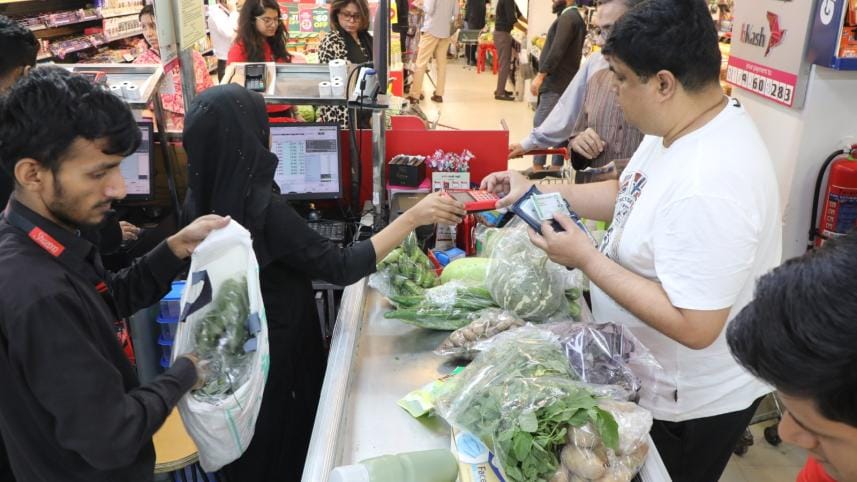Use of credit cards in departmental stores on the rise

The use of credit cards in Bangladesh is increasing sharply, bolstered by growing spending on daily essentials at departmental stores amid higher inflation.
Spending through credit cards jumped to Tk 2,437 crore in August, up 4.09 percent from the previous month's Tk 2,341 crore, according to data from the Bangladesh Bank.
Cardholders spent Tk 1,218 crore -- accounting for 49.99 percent of total transactions made through credit cards -- to purchase commodities at departmental stores in the country, central bank data showed.
In July, 50.11 percent or Tk 1,173 crore of total transactions were done through credit cards in departmental stores.
The increase in credit card spending in departmental stores and retail outlets indicates that consumers are spending more on daily necessities in the face of rising inflation.
In August, food inflation soared 278 basis points to 12.54 percent -- the highest since October 2011, when it stood at 12.82 percent, according to data from the Bangladesh Bureau of Statistics.
As credit cards offer instant cash facilities and interest-free repayment for up to 45 days, cardholders turn to them during times of crisis, such as when costs of food and non-food items are rising as well as to ensure other necessities, multiple credit card users said.
"Due to the high price of commodities, my salary often runs out before the end of the month. In such situations, if my family needed money for an emergency, I used to borrow money from my friends. But after taking the credit card, there is no need to borrow from anyone," said Md Al Amin, a jobholder.
Salauddin Ahamed, another credit card user, added: "I mostly use the credit card to purchase daily essentials from departmental stores since I get 45 days interest-free repayment facilities."
Md Mahiul Islam, head of retail banking at BRAC Bank, said banks conduct campaigns about the benefits of credit cards and ensure promotional offers for credit cardholders so they are more interested to purchase products from departmental stores through cards.
This is one of the reasons for the increase in credit card transactions in departmental stores, he said.
Another reason is that cardholders who are struggling to cope with higher prices may opt to buy daily necessities by availing the interest-free repayment facilities offered by their credit cards, he added.
In an analysis of the expenditure behaviour of credit cardholders, it was found that 12.34 percent of credit cards were used to avail retail outlets services while 9.16 was spent on utilities and 5.95 percent on medicine. Meanwhile, 4.51 percent of transactions were on clothing, 3.44 percent on fund transfers, 3.37 percent on transportation, 2.18 percent on business services and 1.09 percent on professional and government services.
In terms of cross-border transactions, cardholders also mostly used their cards in departmental stores in August.
About 26.73 percent of transactions outside the country took place in departmental stores. The second highest, which accounted for 15.92 percent of total transactions, were in retail outlets.
In the type-wise breakdown of credit card transactions in the country, about 72.66 percent of transactions were through VISA cards. About 17.08 percent of transactions were through MasterCard while about 10.03 percent of transactions were through AMEX cards.
Bangladesh Bank data also showed that cardholders used their credit cards mostly in India, with about 17.62 percent of cross-border transactions taking place in the neighbouring country.
Of the remaining cross-border transactions, 16.32 percent were in the USA, 9.51 percent in Thailand, 7.69 percent in the UK, 7.61 percent in Singapore, 6.71 percent in Canada, 6.49 percent in the UAE, 5.40 percent in Malaysia, 2.89 percent in Saudi Arabia, 2.81 percent in the Netherlands, 2.73 percent in Ireland, 2.19 percent in Australia and 12.02 percent in other countries.
Meanwhile, foreign nationals in Bangladesh spent Tk 218 crore through credit cards in August, with US citizens accounting for 25.34 percent of transactions. British nationals made 12.39 percent of transactions while Indians were responsible for 10.92 percent and Singapore citizens for 3.74 percent.




 For all latest news, follow The Daily Star's Google News channel.
For all latest news, follow The Daily Star's Google News channel.
Comments